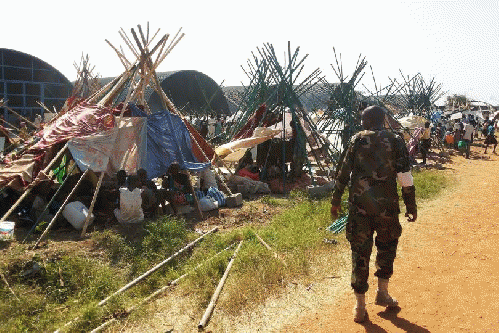Source: Dispatches From The Edge

Civilians at the UN House compound on the southwestern outskirts of Juba. Up to 13,000 South Sudanese civilians have sought refuge at the UN compounds in Juba, fleeing fighting between members of the SPLA (Sudan People’s Liberation Army)
(Image by UPI/UNMISS/Julio Brathwaite) Details DMCA
Hopefully the recent ceasefire agreement between the warring parties in South Sudan will halt that country's downward spiral into civil war. But if it does it will have to buck the convergence of two powerful historical streams: a legacy of colonial manipulation dating back more than 100 years, and the current policies of the U.S. vis-a-vis the African continent.
South Sudan became a country in 2011 when its residents voted overwhelmingly to separate from the Sudan, at the time the largest country in Africa. But a falling-out late last year between South Sudan President Salva Kiir, a member of the Dinka tribe, and Vice President Riek Machar, a member of the Nuer tribe, has plunged the country into war. Cities have been sacked, thousands killed, and almost 200,000 people turned into refugees.
The birth of continent's newest nation was largely an American endeavor, brought about by a polyglot coalition of Christian evangelicals, U.S. corporations, the Bush and Obama administrations, the Congressional Black Caucus, and human rights supporters.
But in many ways the current crisis goes back to November 1884, when some 14 countries came together in Berlin and sliced up a continent. The players represented virtually the entire Western industrial world, although the key participants were Great Britain, France, Germany and Portugal. As South African geographer Matt Rosenberg notes, "At the time of the conference, 80 percent of Africa remained under traditional and local control." When the meeting ended a year later, the colonial powers had created 50 countries "superimposed over the 1,000 indigenous cultures and regions of Africa," thus setting the fuse for future wars and countless ethnic conflicts.
Rich in resources and people, Africa's encounter with the slave trade and colonialism strangled emerging economies, stripped the continent of a huge part of its labor force, and pitted religions and ethnicities against one another in a continent-wide strategy of divide and conquer.
That history laid the foundations for the current spasm of violence in South Sudan that threatens to spill over into several bordering countries.
In 1886 the British divided Sudan between the largely Arab north and the mostly black south. There had long been tension between the two areas because the southern pastoral tribes--mainly the Dinka, Nuer and Shilluk peoples--had historically resisted slave traders from the North. There was intermittent warfare between the tribes over cattle and land, but they also intermarried and traded with each other.
Since the British did not have the forces to occupy the vast southern Sudan, they created a "Southern Policy" that pitted the tribes against one another in a classic divide and rule strategy. They also blocked economic development in order to "preserve [the] purely African way of life of the southern people."
In fact, preserving an "African way of life" meant deliberately suppressing the development of regional governmental institutions or creating an educated population. Instead, authority was vested in "tribal leaders," who had never welded such power in the past. Colonial authorities deliberately banned contact with the more developed north, suppressed Islam and Arabic in the south, and fragmented the region into a bewildering tapestry of tribes and villages. The ultimate scheme was to integrate southern Sudan into British East Africa, but after World War II that was impossible.
So instead London double-crossed the southern Sudanese.
After essentially creating two countries, the British reversed their "Southern Policy" in 1946 and declared the south "inextricably bound, both geographically and economically, to the Arab north as far as future development was concerned." In practice this meant that when Sudan became independent in 1956, the north would dominate the south. "The post independence conflict in Sudan was largely caused by the ethnic division created by the British colonial administration between 1899 and 1956," argues historian Savo Heleta.
The artificially of Sudan's initial creation, coupled with the colonial policies of the British, was a built-in disaster and ignited two civil wars -- from 1955 to 1972 and from 1983 to 2005 -- that killed some 1.5 million people. The last one led to an eventual separation of the two regions, and the 2011 referendum created South Sudan.
Once again Sudan is at war, and current U.S. policies in Africa have not helped. For the past decade and a half, Washington has seemed more concerned with cornering resources than resolving problems and has been quick to choose military solutions over diplomatic ones.
Oil plays no small role in this. Sudan has one of the largest petroleum reserves on the continent, 75 percent of which are in the south. South Sudan pumps some 245,000 barrels a day, but both Sudans profit because it is shipped through northern pipelines to northern refineries on the Red Sea, mostly ending up in China.
The U.S. is in competition with China over oil and resources -- China is Africa's number one trading partner -- and by 2015 the continent will supply 25 percent of the U.S.'s energy needs. A number of U.S. firms are interested in elbowing their way into South Sudan, and Washington is always looking for ways to hem in China's growth.
(Note: You can view every article as one long page if you sign up as an Advocate Member, or higher).





